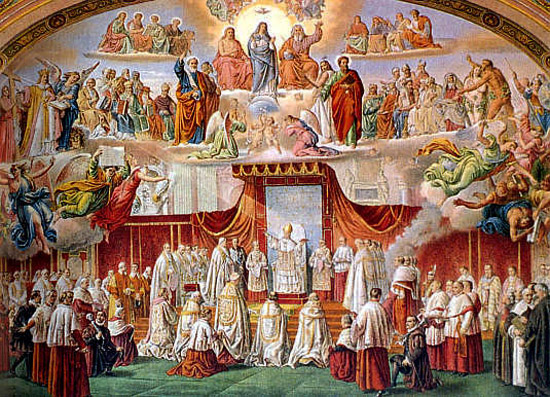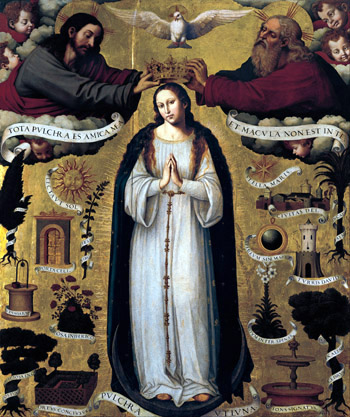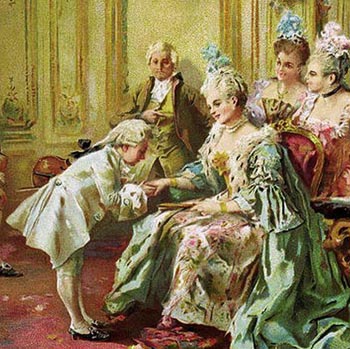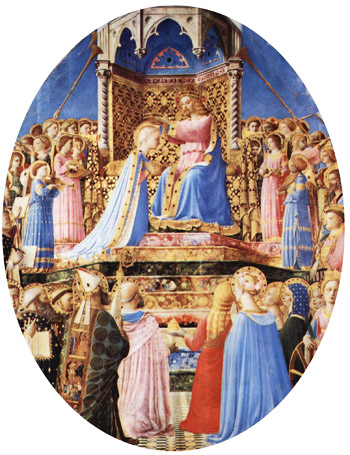Theology of History
 |
 |
 |
 |
 |
 |
 |
Why the Dogma of Immaculate Conception
Raised Hatred
This month of December we celebrate both the feast of St. Francis Xavier (December 3), who was Confessor, Apostle of the Indies and Japan, and Patron Saint of the propagation of the Faith, and the Feast of the Immaculate Conception (December 8).
First, I would like to say something in passing about St Francis Xavier, recalling those words of his that I have mentioned so many times: The worst thing is for the sinner to lose trust in Providence, and thus end up lost. As long as he does not lose this trust, everything is recoverable.
These are such important words, and we should ask him to instill this disposition in our souls, to engrave this truth there so that it becomes an active element of our spiritual life. We should ask him to not let it be just one of the many pious thoughts we hear and then forget, but to let it become a true source of support in difficult moments, an element of encouragement.
 Having said this, I would like to say some words about the Immaculate Conception.
Having said this, I would like to say some words about the Immaculate Conception.
When the dogma of the Immaculate Conception was defined by Pius IX on December 8, 1854, it raised a veritable storm in Europe. A storm of hatred, protest and indignation that came not only from non-Catholics, but also from Catholics. That is to say, in many Catholic circles there was a furor because the dogma of the Immaculate Conception had been defined.
What explains this furor? I ask you to look at the content of the dogma: Our Lady was conceived without original sin from the first moment of her being. Then, I ask: How can this make someone furious?
This can come from the egalitarian hatred of seeing a creature placed at the highest point that a mere creature can be. What is more, this creature is a Woman, and with this, the will of God presents itself in a much stronger way, because it takes the secondary element in the human order, which is the woman, and places it at the top of the whole pyramid of Creation. This is already something that wounds egalitarianism enormously.
What is more, they were also upset by the idea that this creature was the object of an exception to the rule that never before had an exception. And the exception is that she was conceived without original sin from the first moment of her being. That is to say, this idea of Our Lady without original sin, breaking a universal rule and thus being placed at such an enormous height in relation to all other men, transgresses the mundane mentality that has hatred for what is sublime.
 Our Lady conceived without original sin, the Mother of God – all this considered as a whole – is so sublime, a being so pure , so immaculate, so elevated above anything imaginable, so virginal in the innermost part of her being because she has none of the impulses that can represent the sting of the flesh, even in a saint. Nor is she subject to this, because she was conceived without original sin.
Our Lady conceived without original sin, the Mother of God – all this considered as a whole – is so sublime, a being so pure , so immaculate, so elevated above anything imaginable, so virginal in the innermost part of her being because she has none of the impulses that can represent the sting of the flesh, even in a saint. Nor is she subject to this, because she was conceived without original sin.
She is something so transcendent in her sublimity, so elevated and so refined in her purity, so different and exalted above the human condition, that what presents itself for our admiration is a figure immensely greater than us, which gives us idea of the sublimity to which God can elevate the human creature, but to which we were not elevated.
And as always happens, from this excellence comes a type of honor and glory for the entire human race. Our gazes rise to an order of being so superior that it breaks the banality of everyday life and, by the desire for sublimity that it creates, directly collides with the egalitarian spirit.
And since the latter hates everything that is sublime and elevated not only because it is egalitarian, but also because of something else that is an actual love for the mundane, the banal, the trivial, if not even the decadent. It follows that revolutionaries have a true hatred for the Immaculate Conception of Our Lady.
This explains, then, the furor that broke out in Europe over this dogma being proclaimed. An anti-Marian rage that is not dead, but is still alive in our days.
Can we find another expression of this furor? I think so. It is the hatred that persons, moved by the spirit of darkness, have towards authentic counter-revolutionaries: A hatred for virtue in its aspects of purity, composure and dignity. They sense this in the counter-revolutionary, which gives them a militant hatred for him.
 Composure, nobility, distinction of manners, even among those who may be of a more modest condition, attracts everyone's attention, and attracts the sympathy of the good. But, at the same time, it gives rise to a true hatred, which is begotten by the hatred that revolutionaries have for Our Lady. In other words, the hatred comes from sensing what is unspeakably sublime in the counter-revolutionary cause and which can be seen in the imponderables that surround those persons who sincerely dedicate themselves to that cause.
Composure, nobility, distinction of manners, even among those who may be of a more modest condition, attracts everyone's attention, and attracts the sympathy of the good. But, at the same time, it gives rise to a true hatred, which is begotten by the hatred that revolutionaries have for Our Lady. In other words, the hatred comes from sensing what is unspeakably sublime in the counter-revolutionary cause and which can be seen in the imponderables that surround those persons who sincerely dedicate themselves to that cause.
Those who like triviality hate those who are not banal, they hate those who strive to orient spirits upwards and seek to communicate in their persons the dignity of children of God, something of the royalty of Our Lady herself. This is precisely what makes the revolutionaries indignant.
For the good, this is a reason for happiness for it is in fact a blessing to be persecuted for the love of justice. But in this beatitude a refinement can be made, which is the fact of being persecuted because of our love for Our Lady, and for the same reasons that Our Lady is hated.
So, on the feast of the Immaculate Conception and its octave days, we must ask Our Lady to give us this blessedness of being by uniting ourselves to her and to reflect her in such a way that it can be said that we are truly hated because of what exists in us that is similar to her. We must ask for this grace and ask it with insistence.


First, I would like to say something in passing about St Francis Xavier, recalling those words of his that I have mentioned so many times: The worst thing is for the sinner to lose trust in Providence, and thus end up lost. As long as he does not lose this trust, everything is recoverable.
These are such important words, and we should ask him to instill this disposition in our souls, to engrave this truth there so that it becomes an active element of our spiritual life. We should ask him to not let it be just one of the many pious thoughts we hear and then forget, but to let it become a true source of support in difficult moments, an element of encouragement.

Pius IX proclaims the Dogma of the Immaculate Conception on December 8, 1854
When the dogma of the Immaculate Conception was defined by Pius IX on December 8, 1854, it raised a veritable storm in Europe. A storm of hatred, protest and indignation that came not only from non-Catholics, but also from Catholics. That is to say, in many Catholic circles there was a furor because the dogma of the Immaculate Conception had been defined.
What explains this furor? I ask you to look at the content of the dogma: Our Lady was conceived without original sin from the first moment of her being. Then, I ask: How can this make someone furious?
This can come from the egalitarian hatred of seeing a creature placed at the highest point that a mere creature can be. What is more, this creature is a Woman, and with this, the will of God presents itself in a much stronger way, because it takes the secondary element in the human order, which is the woman, and places it at the top of the whole pyramid of Creation. This is already something that wounds egalitarianism enormously.
What is more, they were also upset by the idea that this creature was the object of an exception to the rule that never before had an exception. And the exception is that she was conceived without original sin from the first moment of her being. That is to say, this idea of Our Lady without original sin, breaking a universal rule and thus being placed at such an enormous height in relation to all other men, transgresses the mundane mentality that has hatred for what is sublime.

The superiority of Our Lady raises the hatred of the Devil
She is something so transcendent in her sublimity, so elevated and so refined in her purity, so different and exalted above the human condition, that what presents itself for our admiration is a figure immensely greater than us, which gives us idea of the sublimity to which God can elevate the human creature, but to which we were not elevated.
And as always happens, from this excellence comes a type of honor and glory for the entire human race. Our gazes rise to an order of being so superior that it breaks the banality of everyday life and, by the desire for sublimity that it creates, directly collides with the egalitarian spirit.
And since the latter hates everything that is sublime and elevated not only because it is egalitarian, but also because of something else that is an actual love for the mundane, the banal, the trivial, if not even the decadent. It follows that revolutionaries have a true hatred for the Immaculate Conception of Our Lady.
This explains, then, the furor that broke out in Europe over this dogma being proclaimed. An anti-Marian rage that is not dead, but is still alive in our days.
Can we find another expression of this furor? I think so. It is the hatred that persons, moved by the spirit of darkness, have towards authentic counter-revolutionaries: A hatred for virtue in its aspects of purity, composure and dignity. They sense this in the counter-revolutionary, which gives them a militant hatred for him.

Distinction of manners raises scorn & ire in the modern day egalitarian man
Those who like triviality hate those who are not banal, they hate those who strive to orient spirits upwards and seek to communicate in their persons the dignity of children of God, something of the royalty of Our Lady herself. This is precisely what makes the revolutionaries indignant.
For the good, this is a reason for happiness for it is in fact a blessing to be persecuted for the love of justice. But in this beatitude a refinement can be made, which is the fact of being persecuted because of our love for Our Lady, and for the same reasons that Our Lady is hated.
So, on the feast of the Immaculate Conception and its octave days, we must ask Our Lady to give us this blessedness of being by uniting ourselves to her and to reflect her in such a way that it can be said that we are truly hated because of what exists in us that is similar to her. We must ask for this grace and ask it with insistence.

Our Lady, Queen of all the Angels & Saints

Posted December 13, 2023
______________________
______________________





